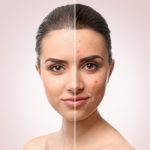Vitamin A is required by the body so that it can grow healthily and steadily. It is also an important vitamin for healthy eyesight, reproduction, cell recognition and immune function.
The working of different organs like kidneys, heart, lungs etc., are also determined by this vitamin. In the U.S., vitamin A deficiency does not occur often. However, if it does, it causes eye issues, even night blindness.
There are many foods high in vitamin A such as broccoli, pistachios, sweet potatoes and grapefruits.

Benefits of Vitamin A
According to science there are many benefits of Vitamin A such as:
1. Vitamin A for Cancer
Scientists are inquiring on whether consuming a sufficient amount of carotenoids can lower the chances of developing different cancer types such as prostate or lung cancer. Evidence has shown mixed results regarding this thought.
2. Vitamin A for hair
This vitamin is required for the development of body tissues, such as hair and skin. The development of sebum, the oil responsible for regulating moisture level of skin and hair, happens with this vitamin. Vitamin A provides many hair benefits such as it promotes the hair growth and prevents the hair fall.
3. Vitamin A for Eyes
vitamin A is an essential vitamin that is very much required to restore eyesight. This vitamin helps in transforming the light that focuses on the eye as an electrical signal to be transmitted to the brain.
Nyctalopia, also known as night blindness, is the starting symptoms presented when developing vitamin A deficiency.
People with vitamin A deficiency can have eye diseases such as night blindness because this vitamin is present as a constituent in eye pigment rhodopsin.
Rhodopsin pigment is present in the eye retina and is sensitive to light. Individuals with this deficiency have difficulty seeing in the dark as their eyes cannot gain enough light to see. Read our blog post to learn more Tips To Keep Eyes Healthy.
4. Vitamin A boosts Immune System
Vitamin A plays an important roles in your body such as it keeps up your body’s defense systems. These defenses may be mucous secretions in different organs such as lungs, gut, eyes and genitals that prevent the entry of bacteria that can cause infections.
White blood cells also contain this vitamin that aids in gathering and destroying the bacteria and other invaders in your blood circulation. This helps us to understand that deficiency of vitamin A increases the chances of infections and recovery time after getting ill.

5. Vitamin A for skin
Acne is a chronic skin disorder characterized by inflammation. The appearance of painful marks and blackheads happen in this condition in places of chest, face and back.
Acne happens when your sebaceous glands have accumulated dead skin and oils on it. The hair follicles present on the skin contain sebaceous glands that form oily sebum, used to protect the skin against moisture and keep it slick.
Increased development of protein keratin occurs with vitamin deficiency in hair follicles that can result in skin disorders such as the formation of acne spots.
6. Vitamin A to Build Bone Strength
There are some important nutrients to build bone strength such as protein, Vitamin A, vitamin D and calcium. Weak bones are due to the low levels of this vitamin, which is beneficial in strengthening bones and their growth after being consumed in enough quantity.
Actually, people having sufficient vitamin A have more secure bone strength than those with fewer amounts, which can cause bones fractures.
Recommended amount of Vitamin A
Vitamin A for Men
Men should take 900 mcg per day.
Vitamin A for Women
Women should take 700 mcg per day.
















